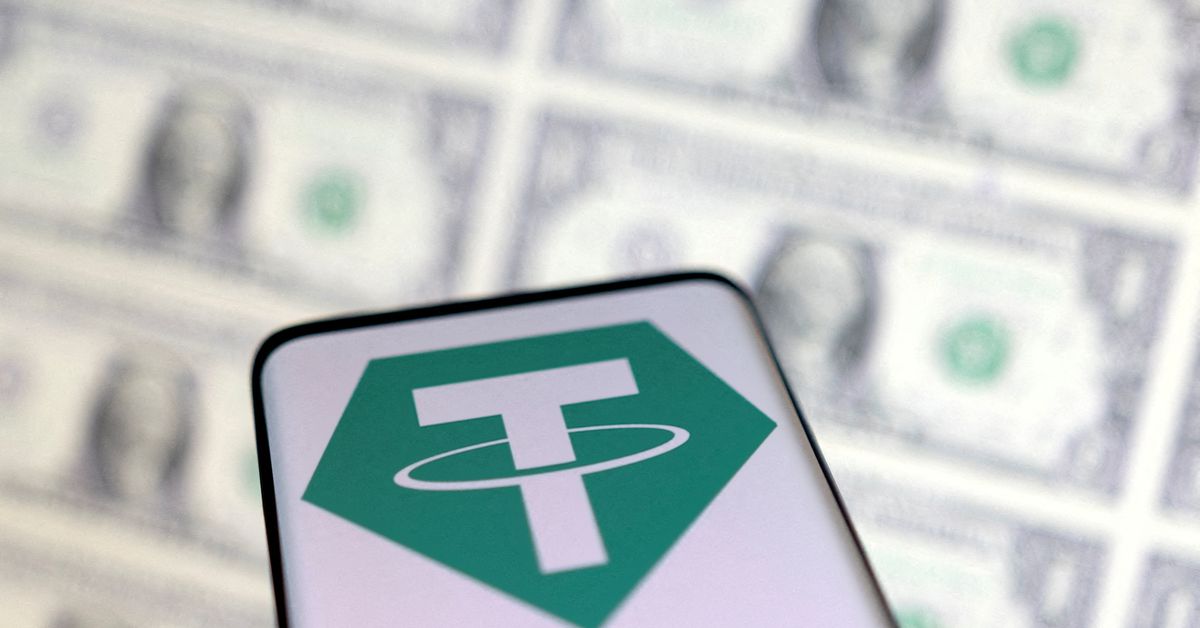Smartphone with Tether logo is placed on displayed U.S. dollars in this illustration taken, May 12, 2022. REUTERS/Dado Ruvic/Illustration/File Photo
June 16 (Reuters) – Major cryptocurrency volatility has hit stablecoins, typically considered the market's safer-havens, with investors pulling money out of the sector and several losing the peg to their underlying assets.
The market capitalization of stablecoins had plummeted to $156.8 billion on Thursday, from around $181 billion at the start of May, CoinGecko data showed.
Tether , the world's largest stablecoin, briefly dropped to $0.993 on Wednesday, though it quickly regained parity with the dollar.
"Stablecoin market cap goes hand in hand with sentiment and liquidity in crypto markets, and it's slightly worrying that USDT appears to see another round of liquidations," crypto digital asset manager IDEG wrote in a note.
Digital asset markets are facing a perfect storm, reeling after crypto lender Celsius froze withdrawals and transfers between accounts on the heels of last month's demise of the terraUSD stablecoin, as well as global tightening of monetary conditions making riskier assets such as cryptocurrencies less attractive.
Stablecoins are crypto tokens pegged to the value of mainstream assets such as the dollar, and are the main medium for moving funds across digital tokens or into cash due to their lower volatility.
They are also the target of funds that arbitrage between exchanges and geographies, and try to bet on stablecoins that are quoted marginally below par regaining their parity.
Worries over reserves-backed Tether's exposure to Celsius, as well as ongoing concerns about its reserve assets, have seen it lose more than $5 billion in market cap in the past 30 days.
"There is some recognition they (Tether) are going to have some bad loans because of Celsius," said Joseph Edwards, head of financial strategy at crypto firm Solrise Group.
However, "Tether's market cap is still above $70 billion and these things are like a drop in an ocean", he added.
For its part, Tether said any loans to Celsius were overcollateralized and that worries about the make-up of its commercial paper reserves were being fuelled by "false rumours".
A number of algorithmic stablecoins – which, similar to terraUSD, use complex mechanisms to control token supply and maintain their peg to the underlying asset – have also taken a hit.
USDD, the algorithmic stablecoin of smart contract platform Tron and the ninth-largest stablecoin by market cap, lost its peg to the dollar on Monday, at one point dropping as low as $0.96 as short-sellers built up extreme positions against the cryptocurrency, according to researcher CryptoCompare.
Tron founder Justin Sun promised to deploy more than $2 billion to defend the stablecoin's peg.
"I don't think they can last for even 24 hours. Short squeeze is coming" he tweeted on Monday. Sun did not respond immediately to a request for comment.
The Tron DAO, which manages reserves for the stablecoin, said on Wednesday it would remove 2.5 billion of its tron tokens off the Binance crypto exchange to help bolster USDD. However, USDD has yet to regain its peg and is trading at $0.976.
Other algorithmic stablecoins have also faced de-pegging in the past few weeks, including the Frax stablecoin, which has since recovered, and the Neutrino USD ,which dropped as low as $0.93 on Wednesday and is still trading under the dollar at $0.966.
Still, these stablecoins are much smaller in size than Tether, or even terraUSD at its peak.
"There are depegs in algoriththmic stablecoins again but those keep happening over and over… if something bad were to happen to them it wouldn't represent any fracture for the ecosystem in the way Tether would have done," Edwards said.
One potential winner of the current turmoil is USD Coin, backed by reserves of cash and U.S. Treasury notes, which has seen its market cap steadily climb to more than $54 billion from $52 billion over the past month even as other stablecoins struggled.
Our Standards: The Thomson Reuters Trust Principles.
State securities regulators in Alabama, Kentucky, New Jersey, Texas and Washington are investigating crypto lender Celsius Network's decision this week to suspend customer redemptions, Texas' director of enforcement Joseph Rotunda told Reuters on Thursday.
Reuters, the news and media division of Thomson Reuters, is the world’s largest multimedia news provider, reaching billions of people worldwide every day. Reuters provides business, financial, national and international news to professionals via desktop terminals, the world's media organizations, industry events and directly to consumers.
Build the strongest argument relying on authoritative content, attorney-editor expertise, and industry defining technology.
The most comprehensive solution to manage all your complex and ever-expanding tax and compliance needs.
The industry leader for online information for tax, accounting and finance professionals.
Access unmatched financial data, news and content in a highly-customised workflow experience on desktop, web and mobile.
Browse an unrivalled portfolio of real-time and historical market data and insights from worldwide sources and experts.
Screen for heightened risk individual and entities globally to help uncover hidden risks in business relationships and human networks.
All quotes delayed a minimum of 15 minutes. See here for a complete list of exchanges and delays.
© 2022 Reuters. All rights reserved
Author
Administraroot


